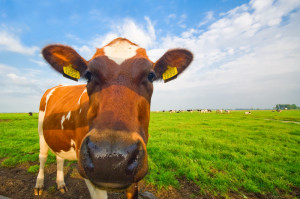Milk Sensitivity
Have you been weaned yet??

© Can Stock Photo
I told my new gastroenterologist I had a milk sensitivity. He wasn’t surprised, but what he said surprised me. He told me just about everyone a problem with a dairy sensitivity sooner or later. I asked him why people should have so much trouble digesting milk, cheese, and other dairy products. I wanted to hear what he’d say. He told me that in nature, animals are weaned (stop nursing on their mothers) by the time they are adults, at the latest. Once the time for digesting milk products is over, the ability to digest them fades away. The body doesn’t waste the energy to keep that ability once the milk flow stops coming. In fact, he told me almost EVERYONE becomes lactose intolerant at some point!
Lack of lactose digestion…
I think most people that have a milk sensitivity have problems with lactose. There are other kinds of milk sensitivities (see below), but that seems to be the most common one. Lactose is a sugar. If it’s not digested, it proceeds to the large intestine where bacteria and yeast devour it. These bacteria and yeasts then create gas, and other intestinal irritants. They also breed out of control. This leads to bloating, which in many people (especially people with IBS) leads to gas, bowel cramping, diarrhea, abdominal pain, and even constipation! So I asked my doctor:
Does Lactaid or other lactose enzymes pills help with milk sensitivity?
He chuckled a little, but then got serious. He told me that people that have a very minor case of lactose intolerance can get away with using lactose enzyme pills. He went on to say that anyone with a high sensitivity to milk lactose would probably still have problems even when using lactose enzyme pills.
The case against casein:

© Can Stock Photo
If all this wasn’t bad enough, there are other kinds of milk sensitivity besides lactose intolerance. Casein is a protein found in the milk of many mammals (humans included). However, some people are allergic to casein, and other people are sensitive to it. In fact casein has a chemical structure that is similar to gluten. LOTS of people have trouble with gluten! Could there be a link here? Stay tuned…. Casein is found in all kinds of things, from sports energy bars to margarine! It goes by many names including:calcium casein, casein hydrolysate, magnesium casein, potassium casein, rennet casein, sodium casein. It’s used as an additive in many foods.
Meanwhile, back to milk sensitivity in general:
What my gastro doc said made me think (again) how strange it is that we drink milk or eat dairy products. Human milk is for baby humans. Cows milk is for baby cows.
If you have IBS, I think you should find out if you have a milk sensitivity.
Talk to your doctor and/or a dietician, and maybe try a food elimination diet. This may find other foods you may be sensitive to! Good luck and let me know how you make out in the comments section! Find out more about food sensitivities. Look here for lactose intolerance.
4 Replies to “Milk Sensitivity”
Shawn,
I love your site, and have IBS like symptoms when eating either wheat or gluten (I have not pinpointed it). For example – beer does not bother me, and frequently can ease the symptoms :D
Here’s my concern/question: We need calcium for strong bones, so if the dairy products made with cow’s milk, which we’re not supposed to be consuming, is the main source of calcium in the diet, then how should we get the right amount of calcium in our diet, on a daily basis? Milk, cheese, yogurt is all ‘off limits.’
Thanks…..
Thanks for the compliment, Jules. I’m glad a brew eases your symptoms :). A number of things contribute to strong bones. Having enough vitamin D in your system helps process the calcium. You can get that by the sun on your skin. Lots of dark leafy green veggies have calcium as do some fish, etc.
I”m sure there are other things, that I’m not even aware of for getting calcium.
And of course, there’s always a calcium supplement. I’ve read that calcium citronate is better than calcium carbonate, if that’s something you want to try. That’s what I take anyway.
Hey, Shawn.
check out the info on raw milk at http://www.westonaprice.org.
Interesting stuff! I have a friend that is a huge proponent (okay a zealot) of raw milk. He’s also into goat’s milk. I don’t know where he gets it, but his cheddar is the only kind I can eat without getting sick. Thanks Sharon!